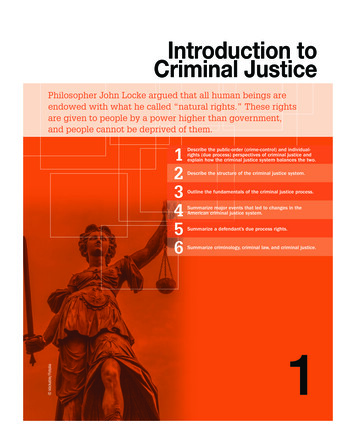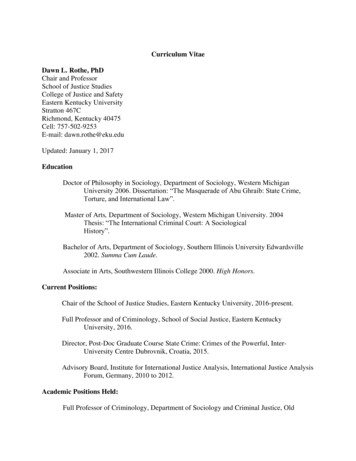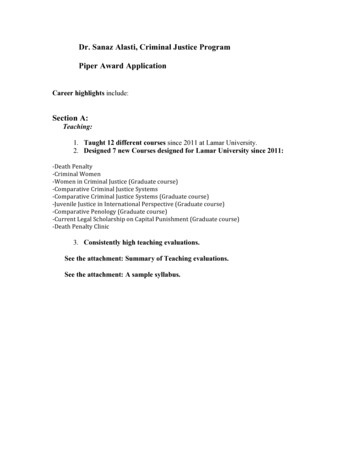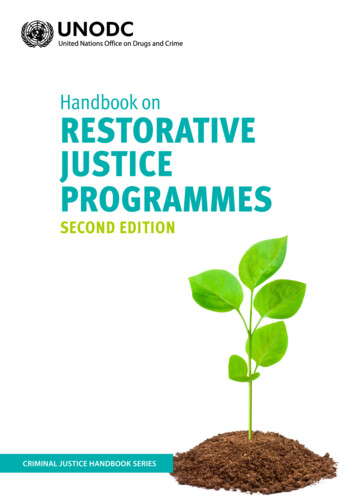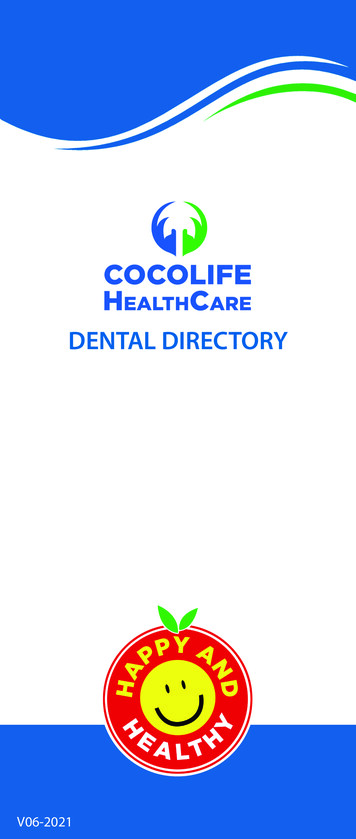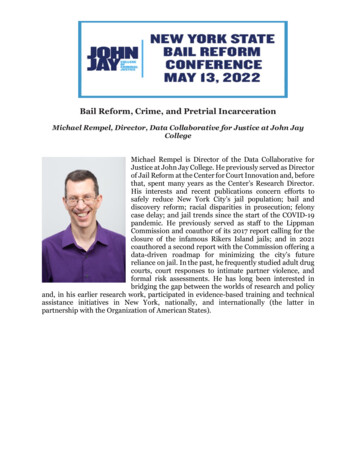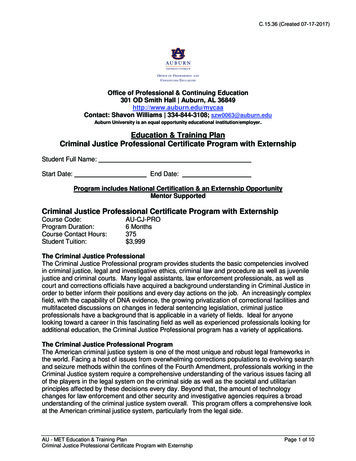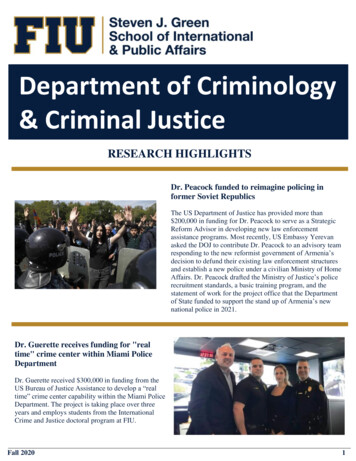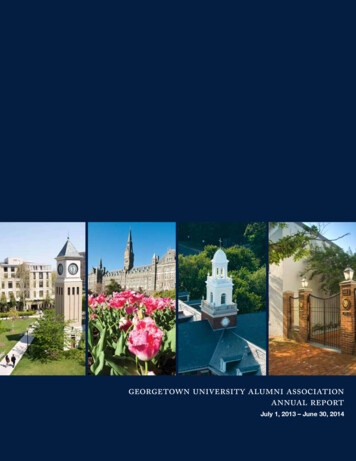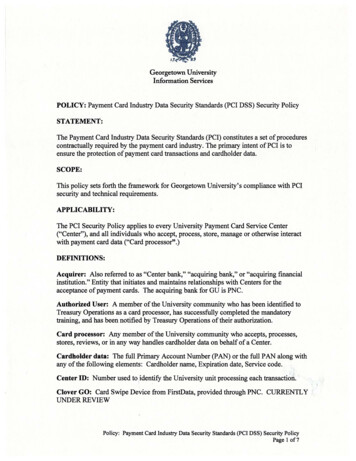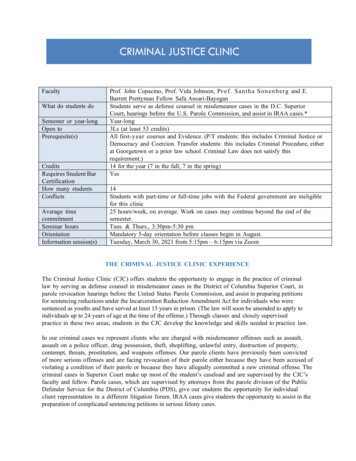
Transcription
CRIMINAL JUSTICE CLINICFacultyWhat do students doSemester or year-longOpen toPrerequisite(s)CreditsRequires Student BarCertificationHow many studentsConflictsAverage timecommitmentSeminar hoursOrientationInformation session(s)Prof. John Copacino, Prof. Vida Johnson, P r o f . S a n t h a S o n e n b e r g and E.Barrett Prettyman Fellow Safa Ansari-BayeganStudents serve as defense counsel in misdemeanor cases in the D.C. SuperiorCourt, hearings before the U.S. Parole Commission, and assist in IRAA cases.*Year-long3Ls (at least 53 credits)All first-year courses and Evidence. (P/T students: this includes Criminal Justice orDemocracy and Coercion. Transfer students: this includes Criminal Procedure, eitherat Georgetown or a prior law school. Criminal Law does not satisfy thisrequirement.)14 for the year (7 in the fall, 7 in the spring)Yes14Students with part-time or full-time jobs with the Federal government are ineligiblefor this clinic25 hours/week, on average. Work on cases may continue beyond the end of thesemester.Tues. & Thurs., 3:30pm-5:30 pmMandatory 5-day orientation before classes begin in August.Tuesday, March 30, 2021 from 5:15pm – 6:15pm via ZoomTHE CRIMINAL JUSTICE CLINIC EXPERIENCEThe Criminal Justice Clinic (CJC) offers students the opportunity to engage in the practice of criminallaw by serving as defense counsel in misdemeanor cases in the District of Columbia Superior Court, inparole revocation hearings before the United States Parole Commission, and assist in preparing petitionsfor sentencing reductions under the Incarceration Reduction Amendment Act for individuals who weresentenced as youths and have served at least 15 years in prison. (The law will soon be amended to apply toindividuals up to 24 years of age at the time of the offense.) Through classes and closely supervisedpractice in these two areas, students in the CJC develop the knowledge and skills needed to practice law.In our criminal cases we represent clients who are charged with misdemeanor offenses such as assault,assault on a police officer, drug possession, theft, shoplifting, unlawful entry, destruction of property,contempt, threats, prostitution, and weapons offenses. Our parole clients have previously been convictedof more serious offenses and are facing revocation of their parole either because they have been accused ofviolating a condition of their parole or because they have allegedly committed a new criminal offense. Thecriminal cases in Superior Court make up most of the student’s caseload and are supervised by the CJC’sfaculty and fellow. Parole cases, which are supervised by attorneys from the parole division of the PublicDefender Service for the District of Columbia (PDS), give our students the opportunity for individualclient representation in a different litigation forum. IRAA cases give students the opportunity to assist in thepreparation of complicated sentencing petitions in serious felony cases.
Students meet their client for the first time in the cellblock in Superior Court before the client’s firstappearance in court. The student’s first task is to interview her client and prepare an argument to convincethe judge that, under the statutes and rules governing pre-trial release, the client should be released pendingtrial. After the first appearance, the student embarks on the myriad tasks involved in representing someonecharged with a crime. To prepare our students for this representation, clinic classes provide intensiveinstruction in constitutional criminal procedure, pretrial and trial skills, sentencing advocacy, and legalethics. The pretrial skills of client interviewing and counseling, fact investigation, negotiation, and theorydevelopment are taught in classes and honed in small group simulations. The trial skills involved inmotions practice, opening statement, cross examination, direct examination, objections, and closingargument are taught through assigned readings, classes, demonstrations, and small group simulations withindividual feedback. Other classes focus on the ethical decisions involved in reconciling the obligation ofzealous representation with the ethical obligations of zealou s rep resentation , as well as broader topicssuch as the impact of race and class on the criminal justice system and the efficacy and fairness of thatsystem.Students do not work in teams and, except in IRAA cases, they work on direct client representation inindividual cases in which the student acts as the attorney under faculty supervision. We believe thatstudents learn best when they 1) have a strong grounding in the theory of representation, 2) have theopportunity to practice the skills necessary for representation in simulations and receive feedback on theirperformance, 3) prepare carefully with close supervision to perform as lawyers, 4) act as lawyers, undercareful supervision, in real cases for which they are completely responsible, with all of the unpredictabilitythat role entails, and 5) have the opportunity to review their performance after each stage of therepresentation and learn from it. The experienced lawyers and teachers in the CJC strive to ensure both thatthe students benefit from an extraordinary educational experience and that their clients benefit fromextraordinary representation from our students.While criminal litigation skills are the major focus of the CJC, the lawyering skills developed in the clinicare applicable beyond criminal practice. Students learn to apply a complex array of law from theconstitution, statutes and case law to the often-changing fact scenarios in a case to attain their client’sgoals. Students learn judgment and problem solving by creating alternatives for attaining those goals andanalyzing the likely outcome of each. Students learn respectful client-centered counseling to involve andempower their clients in the decision-making regarding their cases.Because every case is unique and outcomes are determined by factors beyond our control, we cannotpromise that each student will conduct a trial in court. Even so, every case presents a myriad of learningopportunities, and almost every criminal case provides some litigation experience before a judge.TIME COMMITMENTThe Clinic is demanding and time consuming. Students are required to return to school one week beforeclasses begin to participate in an intensive orientation program. This year the orientation will begin onMonday, August 23, 2021, and will be held every day that week. Participation in the orientation is arequirement for the clinic and no exceptions will be made. This intensive orientation gives students theopportunity to become immersed in making the transition from students to lawyers without the distractionof other responsibilities, and it enables us to begin work with real clients much earlier in the semester.After the orientation, the Clinic meets for class twice each week, on Tuesdays and Thursdays from 3:305:30 p.m. Based on the number of credits they receive, students can expect to work an average ofapproximately 25 hours per week on clinic and casework, although the actual hours vary considerablydepending on the scheduling of trials and hearings. Our students generally find that there is a greateroverall time commitment in the clinic during the fall semester than the spring semester, as they are
devoting more time to learning the essentials of litigating a case for the first time. Because our clients’freedom is at stake in each case, we expect that clinic work will take precedence over most other activitiesin a student’s life when necessary. We expect that students will be responsible for their cases throughgraduation, although the cases often wrap up before that time.CONFLICT OF INTERESTA rigid federal conflict of interest statute precludes students who are employed by the FederalGovernment from participating in the Clinic, because the United States is the prosecuting authority in theDistrict of Columbia.INVESTIGATIONTo be a competent attorney, a student must learn how to conduct fact investigation and must investigateeach case thoroughly. Seana Holland, our experienced staff investigator, will train students ininvestigation, interviewing, and statement-taking. Included in the training are techniques and proceduresfor minimizing danger. Students work in pairs and follow established guidelines designed to ensure safety.However, given the nature of our work and the urban location of our crime scenes, investigating casesinvolves some minimal risks. We believe that investigating our cases is safe, and all our supervisorsregularly go into the field to investigate their own cases. Nevertheless, if you are reluctant to take on theresponsibility of investigating your cases, you should not enroll in this clinic.OPEN HOUSEOn Tuesday, March 30, 2021, from 5:15-6:15 p.m., the CJC will have an open house in the clinic viaZoom. This open house will give students the opportunity to meet the faculty and supervisors and ask anyquestions which they might have. Attendance at the open house is optional.SELECTION CRITERIA/APPLICATION PROCESS1. Each applicant must certify that s/he is eligible to participate in the clinic (i.e., has completed theprerequisite courses and is eligible for admission to the bar under the D.C. Student Practice Rule).2. Applicants must complete the general clinic application by the deadline. When filling out the on-lineapplication, you will be asked to write a clinic-specific statement of interest: Please describe anyexperience you have had in the criminal justice system, criminal law practice, or in working with poorpeople. For employment, please include where you worked, the dates of your work, and a briefdescription of your experience. The statement should also indicate why you wish to enroll in theCriminal Justice Clinic and what you expect to gain from participating in it.3. Those students who satisfy the criteria listed in #1 above form the pool for selection. We willthen select those students who have exceptional prior experience with criminal or poverty lawpractice, or some other experience that, in the judgment of the faculty, will enhance thepedagogical experience of the class. We expect that this will be approximately one-third to onehalf of the slots in the clinic. The remaining slots will be filled by lottery.
TEACHING STAFFThe students will be intensively supervised by Professors John Copacino and Vida Johnson, A d j u n c tP r o f e s s o r S a n t h a S o n e n b e r g , a n d Prettyman Fellow Safa Ansari-Bayegan, and AdjunctProfessors from the Public Defender Service who oversee the parole cases. Seana Holland, our staffinvestigator, teaches investigation and oversees the investigation of cases.PROF. JOHN M. COPACINO: B.A., M.A.T., Duke; J.D., University of Virginia; LL.M., Georgetown.Prof. Copacino has been on the faculty of the Criminal Justice Clinic since 1987. F o l l o w i n g l a ws c h o o l , P r o f. C o p a c i n o w a s a n E . B a r r e t t P r e t t y m a n F e l l o w a t G e o r g e t o w n . He has alsobeen the director of the Criminal Law and the Juvenile Law clinics at Antioch School of Law and theSuffolk Defenders criminal defense clinic at Suffolk Law School. Prof. Copacino was the third recipientof the Law Center’s Frank Flegal Teaching Award, the teaching award given annually for outstandingcontributions by full-time faculty to teaching at the Law Center. He has tried criminal cases in the SuperiorCourt since 1979, serving as lead trial counsel in hundreds of felony cases. He continues to representclients in serious felonies and post-conviction litigation. He is actively involved in efforts to improve thepractice of criminal law in the District of Columbia. He is a former chair of the Steering Committee ofthe D.C. Bar’s Criminal Law and Individual Rights Section and serves on numerous Superior CourtCriminal Division committees. He regularly participates in local and national training programs forcriminal defense lawyers.PROFESSOR VIDA JOHNSON: Prior to joining Georgetown University Law Center, Prof. Johnsonwas a supervising attorney in the Trial Division at the Public Defender Service for the District ofColumbia (PDS), where she worked for eight years. At PDS Ms. Johnson was assigned to the mostserious cases at the “Felony One” level, and her experience included numerous trials in D.C. SuperiorCourt representing indigent clients facing charges including homicide, sexual assault, and armedoffenses. Ms. Johnson’s responsibilities at PDS also included supervising other trial attorneys andserving as one of the agency’s two representatives to the D.C. Superior Court Sentencing GuidelinesCommission. In 2009, Ms. Johnson was a Visiting Associate Professor in the Juvenile Justice Clinicat Georgetown University Law Center. Before joining PDS, Professor Johnson was an E. BarrettPrettyman fellow at Georgetown University Law Center. As a fellow she represented indigent adults inthe D.C. Superior Court and supervised students in the Criminal Justice Clinic. Ms. Johnson earned herlaw degree from New York University Law School in 2000 and she earned her B.A. in American Historyfrom the University of California, Berkeley in 1995.PRETTYMAN FELLOW SAFA ANSARI-BAYEGAN: Safa was born and raised in Houston, Texas. Shereceived her J.D. from Berkeley School of Law where she was an NAACP Legal Defense Fund Earl WarrenScholar. At Berkeley, she co-led the student public defense organization, participated in bi-monthly restorativejustice circles facilitated by the incarcerated people inside San Quentin Prison, volunteered in an asylum clinic,and led a court-watching trip to Mississippi. In the East Bay Community Law Center’s Education AdvocacyClinic, she represented young people in special education administrative hearings and school disciplineproceedings. As a student in the Death Penalty Clinic, she assisted in the representation of an Alabama death rowclient in state post-conviction litigation. For her involvement in public service while at Berkeley, she wasawarded the Eleanor Swift and Francine Diaz Memorial awards. Safa spent her law school summers working atthe Southern Center for Human Rights and the Trial Division of the Public Defender Service for the District ofColumbia. For over two years prior to law school, she worked with the Regional Public Defender Office inLubbock, Texas as a mitigation specialist on a trial level capital defense team. As an undergraduate, she workedon post-conviction capital cases with Texas Defender Service in Houston and lethal injection drug research withReprieve in London. She received her bachelor’s in Political Science and Philosophy from the University ofHouston Honors College and master’s in Human Rights from the London school of Economics and PoliticalScience.
2020-2021 CRIMINAL JUSTICE CLINIC STUDENTSNardos BekeleMadeline CaseLydia DavenportAllison DonahoeOwen EganVictoria FreytesImani GunnTeressa HamsherMackenzie HightowerAfton IzuJohn MarinelliBrittany NagyHanna WallaceBreanna Weber
On Tuesday , March 30, 2021, from 5:15-6:15 p.m., the CJC will have an open house in the clinic via Zoom. This open house will give students the opportunity to meet the faculty and supervisors and ask any . B.A., M.A.T., Duke; J.D., University of Virginia; LL.M., Georgetown. Prof. Copacino has been on the faculty of the Criminal Justice .
